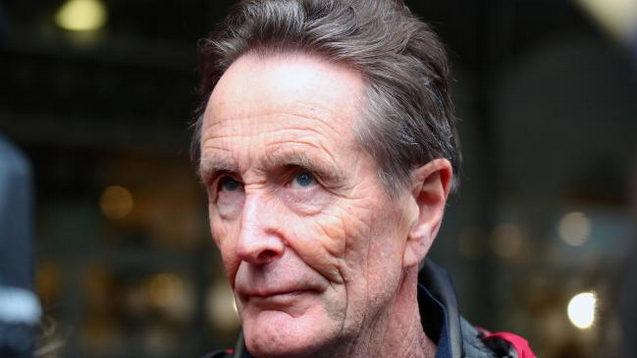Australia will take a new long-term emissions reduction target to November's UN climate summit, as the Morrison government weighs up whether to join more than 80 countries to commit to net zero carbon emissions by 2050.
A review into the potential economic impacts of adopting the goal will be finalised later this year in time for the Glasgow summit, as a growing number of Liberal MPs speak out on the need for the Coalition government to adopt more-ambitious climate policies.
British Prime Minister Boris Johnson, who shares a close relationship with his Australian counterpart, Scott Morrison, has called on countries around the world to follow the United Kingdom in adopting the 2050 target as part of the climate talks this year.
 |
| Federal Energy and Emissions Reduction Minister Angus Taylor: The government expects to reach an emissions target before the Glasgow summit. Credit: Alex Ellinghausen |
"The government expects to deliver a long-term emissions reduction strategy before COP26 (the Glasgow summit)," Mr Taylor said.
Mr Morrison last week vowed not to be "bullied” on climate change as the moderate and conservative wings of the Coalition slugged it out behind closed doors over energy and emissions policies.
While Nationals MPs Barnaby Joyce, George Christensen, David Gillespie and former minister Matt Canavan have called for greater support for the coal industry, a group of Liberals including Tim Wilson, Katie Allen, Fiona Martin, Trent Zimmerman and John Alexander warned their constituents wanted greater action.
Independent MP Zali Steggall, who deposed former prime minister Tony Abbott on a platform of climate action last May, will on Monday seek support from a number of disaffected Liberal MPs following two months of devastating bushfires and smoke-choked capital cities.
Ms Steggall will release the details of her private member's bill to establish a new independent Climate Change Commission which would outsource climate targets and policies to public servants.
The top 10 highest carbon emitters have been named, can you guess who they are?
Mr Taylor said on Sunday the government believed the answer was not a new tax or more bureaucracy but "practical change" driven by science and technology.
"The pathway to meaningful impacts on global emissions is through development and deployment of new technologies," Mr Taylor said.
"That is where Australia can have the biggest impact on reducing global emissions."
He confirmed the government expected to deliver a long-term emissions reduction strategy before the Glasgow summit.
About 80 countries around the world are committed to such a target, but many are small economies with small greenhouse gas outputs.
The European Union is the biggest bloc on the brink of signing up to net zero, with major economies such as China, the US and India showing little sign of similar ambition.
All Australian state governments have adopted the target, with Mr Morrison committing to review the goal as part of last year's Pacific Islands Forum.
When asked directly about the 2050 target, Mr Morrison said he would "never make a commitment like that if I couldn’t tell the Australian people what it would cost them”.
Mr Taylor and Mr Morrison have continued to declare Australia would "meet and beat" its 2030 Paris targets of reducing emissions by between 26 to 28 per cent on 2005 levels, potentially without using Kyoto carryover credits.
As a signatory to the Paris Agreement, the government has also committed to achieving net zero emission globally in the second half of the century.
The government is also close to finalising its draft Technology Investment Roadmap, which it says will set a framework for investment priorities in emissions-reducing technologies over the short term (to 2022), medium term (to 2030) and long term (to 2050).
Ms Steggall will circulate the details of her bill to all MPs as well as business, environmental and relevant stakeholder groups on Monday, with the crossbench MP urging a conscience vote on the issue on March 23.
"It is time to take the party politics out of climate policy," she said. "Now is the time for a rational approach to climate change."
Labor deputy leader Richard Marles said on Sunday the opposition wanted to achieve bipartisanship with the government on climate change policy.
“We have been seeking bipartisanship for a long time in relation to this. But to get bipartisanship, we actually need to have a side that we can talk to,” Mr Marles said.
Links
- (AU) Getting Down To The Business Of Evolving Australia's Climate Policy
- Denmark Floats A Possible Model For Climate Policy
- The Year In Climate Change: Leaders Keep Ignoring The Science, And This Is Not Fine
- The 2010s Were Another Lost Decade On Climate Change
- (AU) 'Breaking Point': Bushfires To Grow Australia' Carbon Footprint.
- (AU) 'Cause For Great Concern': Australia Ranked Last In Global Assessment On Climate Change Action
- (AU) About 100 Countries At UN Climate Talks Challenge Australia's Use Of Carryover Credits
- UNEP Says Global Emissions Must Be Cut By 7.6% Every Year For Next Decade
- Julie Bishop says climate change has been 'weaponised' in Australian politics
- Boris Johnson begins 'year of climate action', pledges ban on new petrol cars




